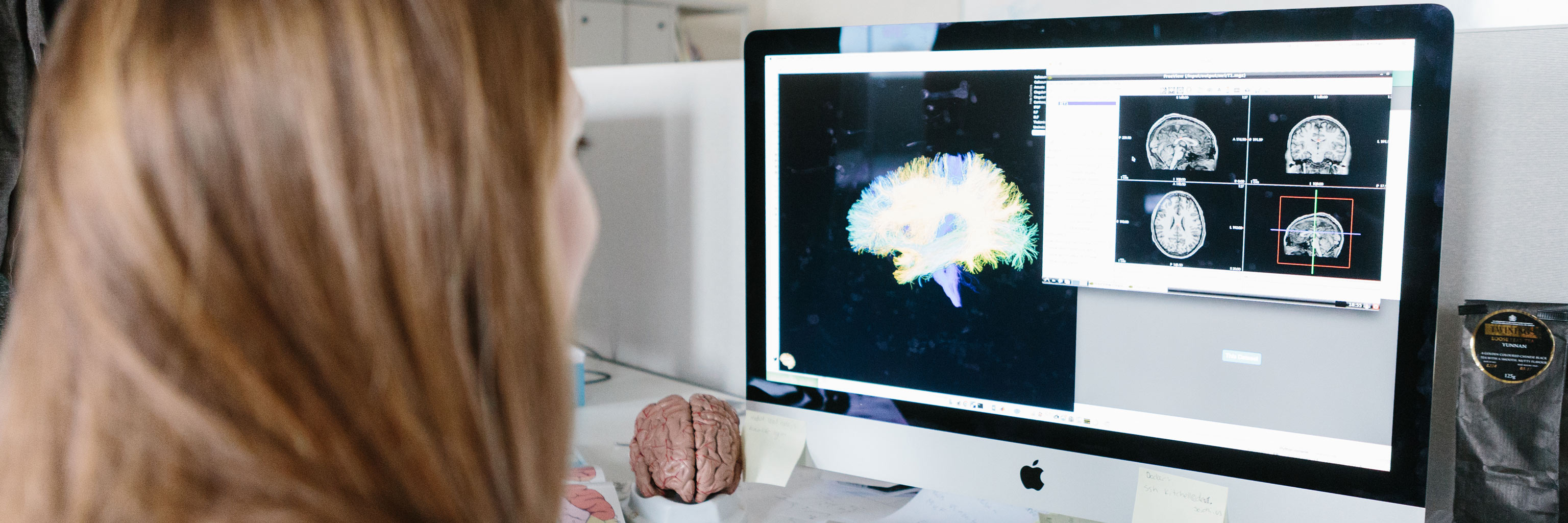Our department offers a Bachelor of Arts degree in Psychology and Bachelor of Science degrees in Psychology, Neuroscience, and Clinical Psychological Science You can also pursue a minor in Psychology, or choose from a variety of certificate programs. Coursework in Psychology and Neuroscience is designed to meet seven learning goals.
Undergraduate
Psychology
Psychology studies behavior, thought, and intelligence to understand the functioning of the brain and neural system. Psychologists study the mechanisms of perception, sensation, emotion, and learning, examining the biological and evolutionary foundations of animal and human behavior. Psychology spans both the natural and social sciences, providing an excellent domain for gaining skills in analytic reasoning, problem solving, statistics, and dealing with people.
Neuroscience
Studying neuroscience provides you with an in-depth understanding of the structure and function of the brain and nervous system. This can be studied at the level of molecules and cells, or at the level of whole brain regions and their connections. Neuroscience includes the study of changes during the lifespan in humans and animals.
Our Neuroscience degree is designed for students interested in pursuing graduate training in neuroscience, attending medical school, or obtaining a research-related position in biotechnology, the life sciences, or the pharmaceutical industry.
Clinical Psychological Science
Clinical psychological science is built on the idea that clinical applications, such as the prevention, assessment, and treatment of psychological suffering, are based on the best available scientific evidence. This central tenet implies that not only are human interventions safe and effective; it also indicates we understand how these interventions work at a causal level in a way that allows us to scale them for use in a variety of settings. Understanding the mechanisms of clinical applications allows us to meet the diverse needs of everyone in a way that is science-based and inclusive. At the core of this degree is a foundation in psychological scientific methodology that can be applied to understanding human behavior and reducing human suffering. As students come to understand the breadth of clinical psychological science, they can flexibly choose their own way of contributing to solving pressing real-world problems.
Our Clinical Psychological Science degree program is designed to prepare students for graduate training in psychological and brain sciences (i.e., its subdisciplines, e.g., clinical psychological science, developmental psychopathology, neuroscience, dissemination and implementation science) and neighboring disciplines (e.g., public health, social work, counseling, mobile health technologies, psychiatry). Moreover, this degree is designed to boost students’ competitiveness for advanced bachelor-level positions in health care (e.g., program evaluator, technician, specialist) and post-baccalaureate paid research positions in psychological and brain sciences.
Why study Psychology, Neuroscience, or Clinical Psychological Science?
Our Psychology major provides a solid grounding in research and writing, along with personal mentoring through research opportunities in faculty laboratories. Relevant to every field, it prepares you for a wide range of careers—in clinical psychology, business, education, law, and policy-related research positions. If you’re interested in social relationships, mental disorders, child development, the relationship between humans and animals, criminality, or any of the many other ways in which humans behave and interact, one of our Psychology degrees may be a good fit for you.
Pursue multiple degrees
Our majors pair well with many other majors, minors, and certificates.
Our Neuroscience program provides a tremendous depth of understanding of the field, from cellular and molecular bases of nervous system function to a systems-level approach to the study of brain-behavior relationships. If you aspire to pursue a career in medicine or veterinary medicine, hope to pursue post-graduate training, or want to obtain a research position in the life sciences, you might consider a degree in Neuroscience.
Personal, meaningful motivations may have driven you to want to help others. Clinical psychological science will help you to apply these motivations in the most evidence-based way, so that you can be accountable to the people that you want to help. Moreover, you may have become aware that our clinical applications could benefit from scientific and technological innovations, such that they become more effective for more people. We want to foster your skills to improve these ways to “move the needle” and make a public health impact. If you want to understand the many ways to contribute to bridging science and practice, consider our Clinical Psychological Science degree.
We are part of the College of Arts + Sciences
A degree in Psychological and Brain Sciences provides students with the foundational skills of a liberal arts education, which are prized by employers and vital to a 21st-century career.
Visit the College’s websiteNew career pathways
Students are imagining new ways their knowledge can shape their careers, their communities, and the world. Innovations across the sciences are creating unforeseen opportunities in the worlds of business, law, and education.
Learn about career preparation
 The College of Arts
The College of Arts